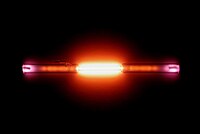
Photo from wikipedia
Abstract In this work an E87-12S Aquivion® short side chain perfluorosulfonic acid membrane, produced by Solvay Specialty Polymers, has been studied for natural gas sweetening applications. The experimental activity has… Click to show full abstract
Abstract In this work an E87-12S Aquivion® short side chain perfluorosulfonic acid membrane, produced by Solvay Specialty Polymers, has been studied for natural gas sweetening applications. The experimental activity has been focused on the effect of feed pressure on pure gas permeation and on the effect of mixed gas composition and CO2 partial pressure on permeation and separation properties of the PFSA considered. The data, obtained at 35 °C, confirm that the permeability of all gases and vapors tested increases by more than two orders of magnitude in the presence of water and reveals that membrane's performance is not substantially affected by the pressure or the presence of a mixed gas feed. Even in humid mixed gas conditions indeed the transport follows an ideal behavior and the permeability of each penetrant is not influenced by the presence of other gases. The real selectivity of the membrane therefore reproduces the ideal selectivity calculated for pure gases at all the investigated gas feeds, which include binary CO2/CH4 mixtures as well as ternary mixtures also containing higher hydrocarbons such as propane and butane. In addition to that, in the whole pressure range considered, no plasticization phenomena were observed and the permeation performances of the materials remained substantially stable when the total pressure was increased from 2 to 15 bar in humid conditions. Overall, the separation performances obtained by Aquivion® membranes remain slightly below the current trade off curve for CO2/CH4 separation, but the high chemical and mechanical resistance of these materials represent an interesting option for membrane separation in a harsh environment.
Journal Title: Journal of Membrane Science
Year Published: 2018
Link to full text (if available)
Share on Social Media: Sign Up to like & get
recommendations!